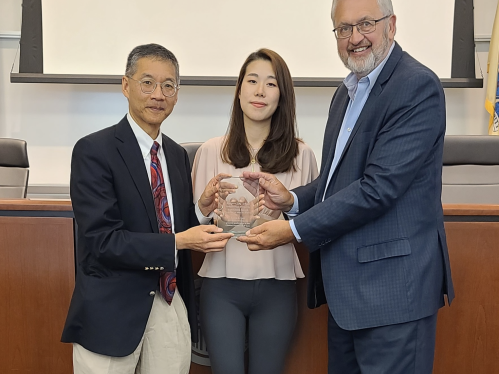Intellectual Property Clinic
Students in the Intellectual Property Law Clinic, under the supervision of Clinical Law Professor John R. Kettle III, work on numerous projects, including helping new businesses with start-up requests.
This clinic offers intellectual property and entertainment law advice and assistance for non-profit entities, authors, artists, inventors, start-up for profit businesses and microenterprises and charter schools, including intellectual property audits and licenses, copyright, trademark, right of publicity, trade secret, and patent assistance.
If you need legal services, contact the clinic: (973) 353-3226
A Clear Need
During the 2016-2017 school year, Kettle said there has been a notable increase in requests from individuals, entrepreneurs, and start-up businesses seeking clinical assistance for intellectual property needs.
The clinic typically receives on average 75-90 requests each semester from potential clients from around the country. However, this past fall and spring semesters, the clinic saw a 30% increase in requests for services.
The requests and subsequent intakes are primarily for trademark and patent-based assistance, but copyright, trade secret, entertainment, and licensing-based matters also enter the mix of work requested and performed.

The clinic is proud to be part of the United States Patent and Trademark Office Law School Clinical Program, participating on the trademark side. The Clinic has, for instance, filed over 225 trademark applications, with 44of those applications filed this past academic year alone.
“My goal is to provide both a broad-based and intensive intellectual property experience for each student. For instance, I will select and assign to each student client matters that typically range from and involve protecting the initial idea, helping the client select the most appropriate form of business entity, and then assisting the client in obtaining and maintaining the best protection for their intellectual property rights, whether it be copyright, trademark, trade secret or patent-based. The clinical law student has direct client contact and is responsible for each file as if they were in private practice,” said Kettle. “My hope and expectation is that by the end of the student’s clinical experience he or she will be able to contribute starting day one at a law firm by being able to identify the relevant intellectual property involved and to provide a client with appropriate advice, counsel and assistance.”
Although intellectual property litigation services are not offered by the clinic, the clinical law students are responsible for providing a broad range of services, from the initial intake and engagement letter, to conducting searches and providing opinion letters, to prosecution of applications, to maintenance of registrations, and finally to file closures.
With over 110 client matters attended to by the clinical law students during the Spring 2016 semester, the Rutgers Intellectual Property Law Clinic anticipates another banner year, which is a welcome sign of a healthy economy.
Among those helped by the clinic in 2016 were:
- A husband and wife whose start-up business is located in Canada who wanted to expand their business and brand to the U.S.A. The clinic’s students filed a trademark with the United States Patent and Trademark Office (USTPO).
- A business owner based in California who wanted to register a brand for her start-up clothing line.
- A New Jersey-based author who sought the copyright registration of her literary works.
- A New York-based start-up cleaning company that needed the registration of its service mark with the USPTO.
- A New Jersey- and a Maryland- based inventor who needed the preparation of a provisional application for patents for their respective inventions.
- A Florida-based business owner who wanted to obtain protection for a brand of bakery products.
- A California-based start-up that needed assistance drafting and negotiating its licensing agreements with famous music groups.
“We get to see real world examples. You never know what goods or services your next client is going to have. It was interesting getting to know the clients and their businesses.”
- Joseph Marrazo '17, former President of the Intellectual Property Law Society and member of the Intellectual Property Law Clinic
Explore More